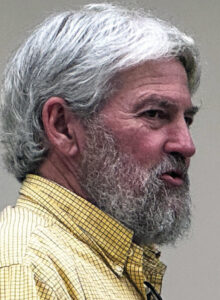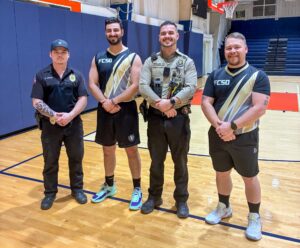Mad cow' found in U.S.
By Staff
INFECTED n Federal officials lead sheep into a stock trailer Wednesday at the Freeman farm in Greensboro, Vt. Officials say the sheep are infected with what may be a form of mad cow disease. AP photo
March 22, 2001
GREENSBORO, Vt. (AP) Federal agents seized a Vermont farmer's flock of 234 sheep Wednesday for fear they are infected with a version of mad cow disease the first such action ever taken against livestock in the United States.
The U.S. Agriculture Department has no choice but to take this decisive action based on the threat the sheep pose to the health of America's livestock nationwide,'' said Craig Reed, administrator of USDA's animal and plant health inspection service.
A team of federal agents and agriculture officials arrived at Houghton Freeman's farm at daybreak. Two cattle trucks were loaded up by 11 a.m. and will take the sheep to Iowa, where they will be tested and destroyed.
Freeman and another farmer had waged a court battle to save their sheep after the Agriculture Department ordered the flocks seized last July.
The flocks consisted of sheep that were either imported from Belgium in 1996 or were descendants of those animals.
The seizure went peacefully, but Thomas Amidon, a lawyer for Freeman, called it sad, depressing and a rushed judgment.''
This is so unnecessary,'' he said.
USDA spokesman Ed Curlett said the seizure was the first of any cow or sheep in the United States under suspicion of having an illness related to mad cow disease.
The USDA has said four sheep from Freeman's flock showed signs of transmissible spongiform encephalopathy, a class of neurological diseases that includes both bovine spongiform encephalopathy, or mad cow disease, and scrapie, a sheep disease not harmful to humans. The government said the sheep may have been exposed through contaminated European feed.
However, the USDA tests could not confirm whether the sheep have BSE. The animals will undergo further testing at a USDA lab in Ames, Iowa.
There have been no confirmed cases of mad cow disease in the United States. Scrapie has been in the United States since at least 1947.
The sheep are highly unusual and valuable East Friesians. They were not being raised for their wool or their meat, but for their rich milk, used in making exotic cheeses.
The Vermont Health Department asked the sheep owners to stop selling the cheese last July. In Europe, there has been no evidence that mad cow disease can be spread through milk.
The second disputed flock of about 140 sheep is owned by Larry and Linda Faillace of East Warren. No date has been set to take their sheep.
Linda Faillace said Wednesday she felt anger, frustration, disbelief'' and accused the USDA of failing to heed science.
That's what makes us so angry. USDA builds up public hysteria over a species that doesn't get the disease,'' she said.
The human version of BSE, which like the animal version has a long incubation period, has killed almost 100 people in Britain and other European countries since 1995. The scare has virtually wiped out the British beef industry.
After losing their case in U.S. District Court in February, the Faillaces and Freeman appealed and asked that the seizure order be put on hold until the case had worked its way through the courts. An appeals court refused to stay the seizure but said it would hear the case.
The farmers also sought help from the Vermont's congressional delegation, but all three members stood by the USDA.
Too little is yet known about this disease, but we do know that it is deadly and that it has the potential to spread quickly, widely and insidiously if not handled early,'' Sens. Patrick Leahy and James Jeffords and Rep. Bernard Sanders said in a statement.
The Vermont Farm Bureau also supported the animals' destruction.
The more you look into it, the more you realize it's not a perfect world, and the science isn't perfect, the risk isn't worth it, and you move on,'' said the bureau's president, Clark Hinsdale.
The USDA offered the farmers up to $2.4 million for their flocks last year, but they refused, deciding instead to continue their court fight. USDA veterinarian Dr. Linda Detwiler said the farmers will be compensated for the fair market value of their sheep.
While the seizure was a first, a flock of 21 sheep from the same family of sheep was voluntarily turned over to government officials last summer by their Vermont owner and were destroyed.







